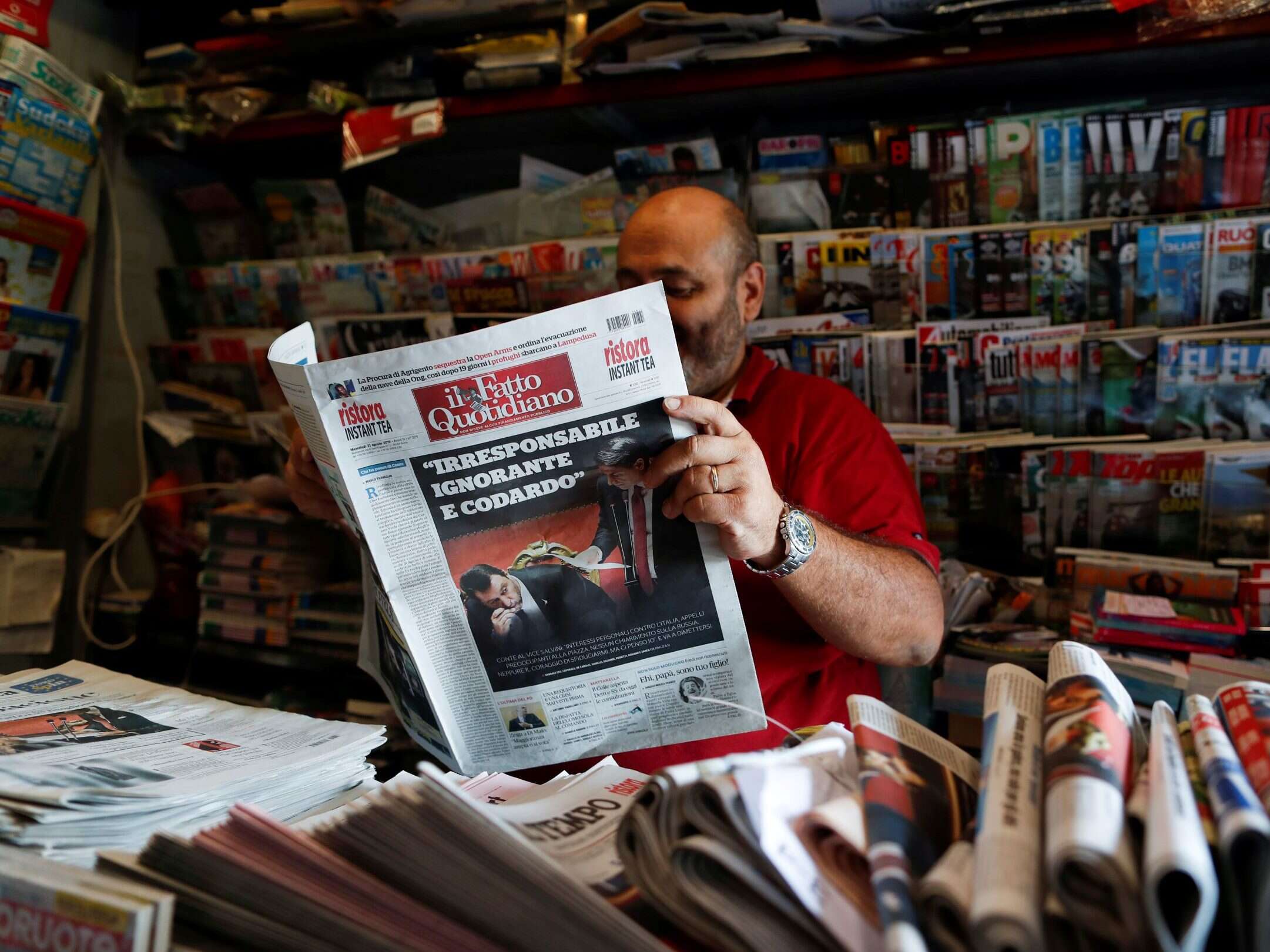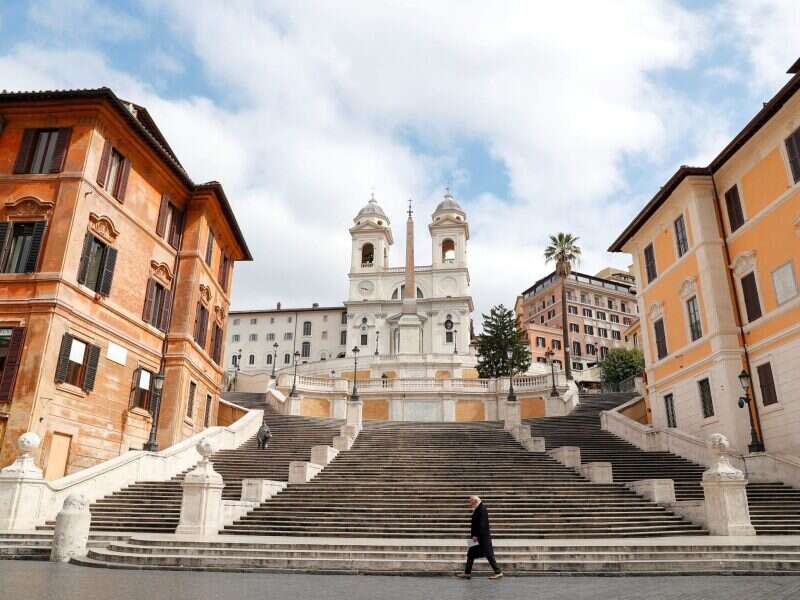
In Italy, the European country worst affected by the coronavirus (Covid-19) pandemic, “the only people who seem to be working more than before are journalists and doctors”, according to one British correspondent.
The Italian government has put the country in an unprecedented lockdown in an attempt to slow the spread of the virus, which has claimed more than 1,000 lives in the country so far.
Schools, restaurants and most businesses have been shut down, but news kiosks are, alongside pharmacies and supermarkets, among the few among essential businesses allowed to stay open.
The UK is said to be a few weeks behind Italy in terms of the number of cases of the virus, with ten deaths so far. The UK Prime Minister has warned it is the “worst public health crisis for a generation”.
In Italy, under new strict measures, anyone who leaves their home must fill out a special form explaining their reasons for doing so.
A number of British journalists based in the country have told Press Gazette it is unclear whether police, who are enforcing the rules, see reporting as a legitimate reason to travel.
Nick Squires, the Telegraph’s correspondent in Rome, said: “The Government has decided that you’re not meant to move, that ideally you’re not meant to leave the house unless it’s for essential work reasons.
“It’s a grey area whether that includes going to report on people dying of coronavirus.”
Squires has himself decided to stay at home to prioritise his family’s health, but has been working 15 to 16-hour days.
“The only people who seem to be working more than before are journalists and doctors,” he said.
John Hooper, Italy and Vatican correspondent for The Economist, told Press Gazette foreign journalists are “not locked down – or at least we don’t think we are”.
Hooper, currently working from home in Florence, is in a Whatsapp group with other foreign journalists and has not heard of anyone being stopped from travelling by police.
But he said: “It would be nice to have something from the Government explicitly stating that we are allowed to work normally.”
He added that the main Italian journalists’ association has made their own certificates for reporters to produce to tell officials they are going about journalistic business and should be permitted to continue as normal.
“What we are a bit concerned about is whether the policemen on the spot will understand that,” he said.

A man walks past the deserted Rome’s Spanish Steps, on the fourth day of an unprecedented lockdown across Italy to slow the outbreak of coronavirus. Picture: Reuters/Guglielmo Mangiapane
The uncertainty was shared by other journalists, including Financial Times Rome bureau chief Miles Johnson who said the rules are not “entirely clear” but that “assuming the Italian document counts journalism as work reasons then you’re allowed to go outside”.
Most journalists, including editorial staff at Italy’s biggest newspaper Corriere della Sera, are working from home – although Hooper said they seemed to stick it out in the newsroom longer than many other workers.
Hooper visited the badly-hit city of Milan two weeks ago and said the paper’s newsroom was “one of the busiest places in Milan at a time when the business quarter was like a ghost town”
Print presses and the distribution of newspapers is allowed to continue operating, although some magazines have temporarily gone online-only.
Helen Farrell, editor-in-chief of Florence-based culture magazine The Florentine, pointed out that the legislation is open to interpretation.
“Right now you’re not allowed to go out unless it’s for essential work, health, or instances of need, so you have to interpret does delivering a magazine that’s mainly arts and culture based constitute one of those three categories? If you’re a broadsheet [newspaper], it’s probably yes.
“We have a photographer going out to take photos – that’s okay because that is the right to report. Does that [principle] still apply right now? Because this legislation overwrites everything we have the right to do.
“[You] have to interpret everything.”
But the journalists who spoke to Press Gazette praised the fact at least that news kiosks could remain open.
Although most people can access online news from their homes, Italy has the oldest population in Europe with older people still favouring print.
“If they closed the newsstands I think it would be to the detriment of those people,” Johnson said.
More ‘eerie’ than war reporting
Because of the unprecedented nature of the nationwide lockdown, many of the journalists said they were finding it “quite surreal” to report on.
Hooper said: “I’ve reported on a number of wars over the years and this is, in a way, more eerie. It isn’t as obviously fear-inducing but it’s more subtle. It’s more underlying and it is in some ways more unnerving than covering an outright conflict.
“There at least you know you have got some idea where the frontline is, whereas here you don’t know.
“When you’re covering a war normally there will be somewhere safe that you can retire to where you know nothing’s going to happen, not always but often, whereas in this it is all around you in the air.”
Squires added: “I have done lots of disaster stories [in Italy] because we’ve had things like multiple earthquakes, the horrible avalanche where a hotel was buried and we’ve had civil unrest and the Costa Concordia going down.
“The big difference with this is just that in all those cases I was right there on the spot for several days or weeks even, but with this thing I’m not there really. I’m here as in I’m in the country, but I’m not right in the red zone [of northern Italy] because it’s illegal to do so.”
Johnson said it is a “very large story that’s definitely challenging” for traditional journalism to tell, because it’s not possible to “get out there” and talk to people. “It is a very strange one.”
Picture: Reuters/Yara Nardi
Email pged@pressgazette.co.uk to point out mistakes, provide story tips or send in a letter for publication on our "Letters Page" blog

